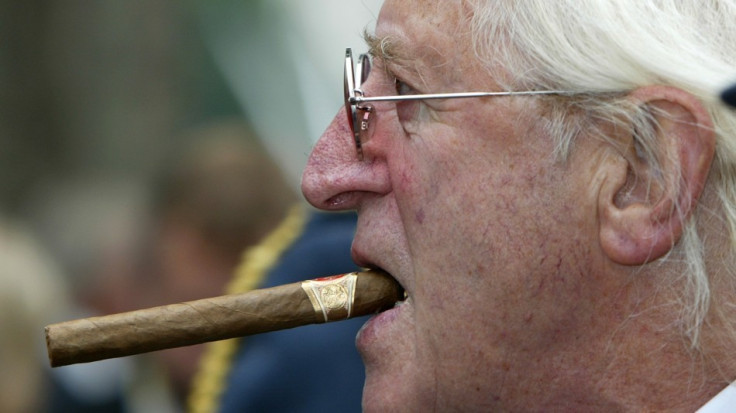Jimmy Savile Scandal: Prosecutors 'Refused to Take Claims Seriously'

Jimmy Savile could have been prosecuted for sexual offences against three woman while he was still alive but the claims were not take seriously enough, a report has revealed.
The Director of Public Prosecutions, Keir Starmer, has apologised to the victims and criticised two police forces for failing to properly investigate the allegations. They were, he said, "unjustifiably cautious" about the claims.
A report from the Crown Prosecution Services (CPS) condemned Sussex and Surrey police for their handling of four allegations against Savile involving girls in the 1970s.
The report said that police had treated the allegations, which were brought forward in 2007 and 2008 with a "degree of caution which was neither justified or necessary".
The decision not to prosecute Savile in 2009 was reviewed by Alison Levitt QC, legal adviser to Starmer. From the evidence, she declared: "Although there are a number of imponderables, had the police and prosecutors taken a different approach a prosecution might have been possible in relation to three of the four allegations."
If follows on from a report by the Met Police and NSPPC which showed how Savile sexually abused children as young as eight for six decades.
Surrey Police first received an allegation against Savile in 2007 from a woman, now in her 40s, who accused the late DJ of assaulting a girl aged 13 or 14 at Duncroft Children's Home in Staines, Middlesex, in the late 1970s.
Two more accusations emerged in the investigation: The first that Savile assaulted a girl aged about 14 outside Stoke Mandeville Hospital in 1973 and a second involving a 17-year-old girl at Duncroft.
Surrey Police failed to tell the victims that other woman had come forward to make sexual abuse allegations against Savile. The report said if they had done so, they would have been more prepared to give evidence.
Then in March 2008, Sussex Police received a complaint that Savile had sexually assaulted a woman in her early 20s in a caravan in the early 70s. The two forces were aware of each other's investigations.
CPS shortcomings
In October 2009, a CPS reviewing lawyer working on the cases advised no prosecutions against Savile could be brought as none of the accusers were prepared to support any police action.
Levitt added the CPS lawyer should have challenged the police conclusions and built up a case against Savile.
Starmer said of the findings by Levitt: "I would like to take the opportunity to apologise for the shortcomings in the part played by the CPS in these cases.
"If this report and my apology are to serve their full purpose, then this must be seen as a watershed moment.
"In my view, these cases do not simply reflect errors of judgment by individual officers or prosecutors on the facts before them. If that were the case, they would, in many respects, be easier to deal with.
"These were errors of judgment by experienced and committed police officers and a prosecuting lawyer acting in good faith and attempting to apply the correct principles. That makes the findings of Ms Levitt's report more profound and calls for a more robust response."
Surrey Police assistant chief constable Jerry Kirkby said: "It is important the actions taken by the investigation team are viewed in context.
"This should take into account what information was known about Jimmy Savile in 2007 and the necessary consideration given by police to the impact of their actions on securing successful court action against him.
"At the time, there was nothing to suggest the level of offending now being reported on a national scale.
"In July 2007, Surrey Police used national systems to conduct intelligence checks with every other police force in England and Wales. These checks found no record of any police intelligence or prior allegations relating to Jimmy Savile."
Deputy Chief Constable Giles York of Sussex Police, who received the caravan assault complaint, said of the report from the CPS: "We welcome the DPP's statement including the finding that the Sussex Police case was handled by experienced and committed officers, who acted in good faith, seeking to apply the correct principles.
Partial information
"We also recognise that we could have done better and are committed to honest reflection and learning lessons for the future.
"We put victim care first and reflect on our actions and we note that the DPP's full report is based on partial information.
"Despite her unwillingness to support a prosecution, we took a full statement from her and carried out further enquiries. Records of the investigation and her statement were forwarded to Surrey Police who submitted them to the CPS to help inform their charging advice.
"We understand the conclusion the DPP has drawn, that our officers may have inadvertently dissuaded the victim from supporting any prosecution. It can be difficult in such circumstances to achieve the balance between supporting and reassuring a victim, whilst providing honest advice about the prosecution process and standard of evidence needed."
© Copyright IBTimes 2025. All rights reserved.






















